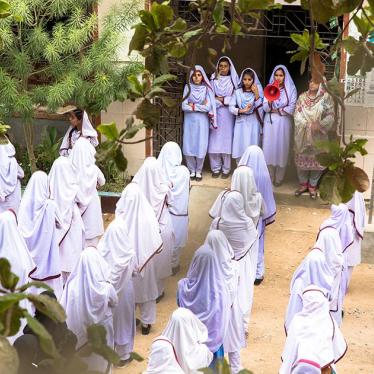To ensure justice for hundreds of thousands of Iraqi victims and their families, the trials of Saddam Hussein and other former Iraqi officials must be fair, Human Rights Watch said today as the trials opened in Baghdad.
“For nearly two decades, we have called for Saddam Hussein and his henchmen to be brought to justice,” said Richard Dicker, director of Human Rights Watch's International Justice Program, who is leading a team of trial observers in Baghdad. “We have grave concerns that the court will not ensure fair trials. To ensure justice and its own legitimacy, the court must fix these deficiencies.”
The Supreme Iraqi Criminal Tribunal (formerly known as the Iraqi Special Tribunal) is an Iraqi court established to try former government officials. Five Iraqi judges make up the trial court. The prosecutors and principal defense lawyers are Iraqi.
The tribunal has the authority to try Iraqis for grave crimes such as genocide, war crimes and crimes against humanity. Funded mostly by the U.S. government, the court will try some of the most notorious human rights violations that took place under the previous government - including the poison gas attacks against Iraqi Kurds and the brutal suppression of the 1991 rebellion in the south.
Saddam Hussein and seven other former Iraqi officials go on trial today for crimes that took place in the town of al-Dujail in 1982. Government security forces allegedly killed more than 140 individuals from al-Dujail in retaliation for an assassination attempt on Saddam Hussein as his motorcade passed through the town.
“We want these trials to succeed. We will be carefully monitoring the proceedings,” said Dicker. “We hope the court respects the right of the accused to mount a vigorous defense.”
In an 18-page briefing paper released last week, Human Rights Watch highlighted concerns that the tribunal is at risk of violating basic fair-trial guarantees.
Problems with the tribunal and its statute include:
• No requirement to prove guilt beyond reasonable doubt.
• Inadequate protections for the accused to mount a defense on conditions equal to those enjoyed by the prosecution.
• Disputes among Iraqi political factions over control of the court, jeopardizing its appearance of impartiality.
• A draconian requirement that prohibits commutation of death sentences by any Iraqi official, including the president, and compels execution of the defendant within 30 days of a final judgment.
The briefing paper is available at: https://www.hrw.org/backgrounder/mena/iraq1005/
Audio commentary on the trial, updated daily by Richard Dicker, may become available online in the coming days. Please check our website.
To read about Human Rights Watch's other work on bringing the former Iraqi government to justice, please see: https://www.hrw.org/doc/?t=justice&c=iraq








